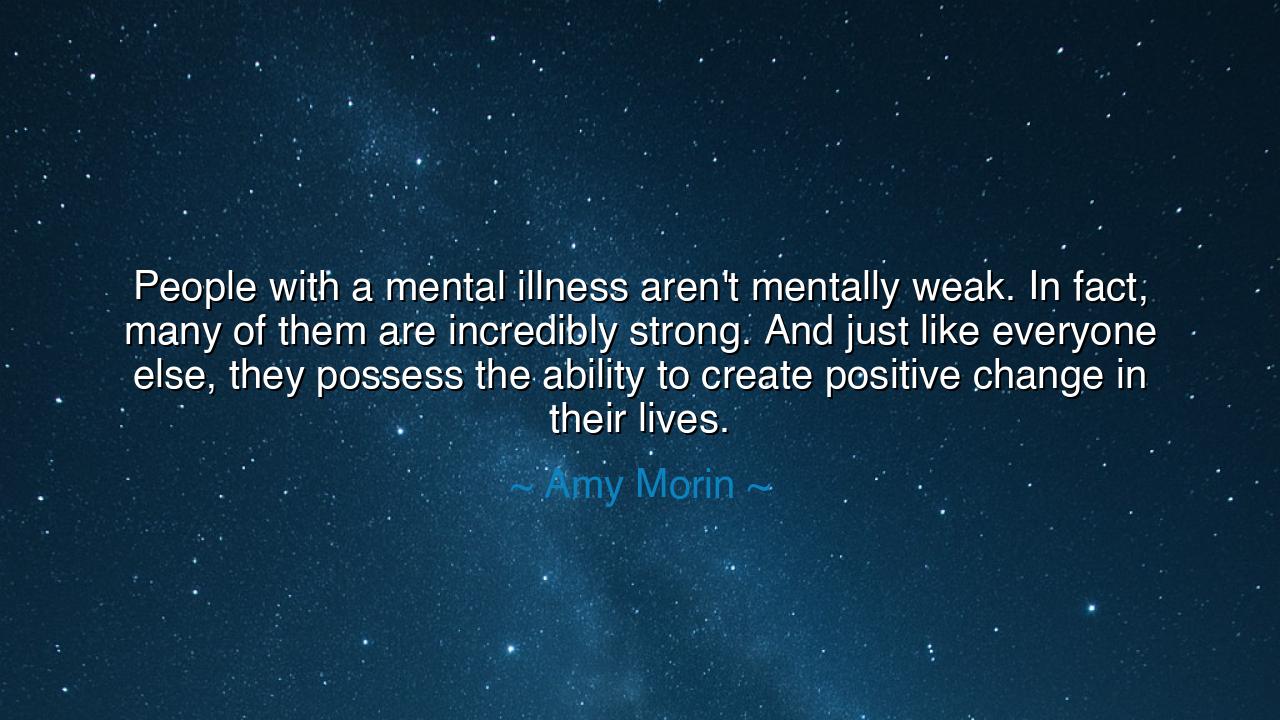
People with a mental illness aren't mentally weak. In fact, many
People with a mental illness aren't mentally weak. In fact, many of them are incredibly strong. And just like everyone else, they possess the ability to create positive change in their lives.






The words of Amy Morin, “People with a mental illness aren’t mentally weak. In fact, many of them are incredibly strong. And just like everyone else, they possess the ability to create positive change in their lives,” shine like a lantern in the darkness of stigma. She rebukes the false belief that suffering of the mind is the same as weakness of spirit. Instead, she reveals the deeper truth: that to live with such burdens and still endure is to possess a strength few can comprehend.
The origin of such wisdom lies in the long silence that has shrouded matters of the mind. For centuries, those with mental illness were cast aside, mocked, or feared, their struggles mistaken for flaws of character. Yet history has shown again and again that those who endure such trials are not broken—they are battle-tested, forged in inner wars unseen by the eyes of others. To recognize this is to honor their resilience, and to admit that strength is not always loud or visible.
Consider the life of Vincent van Gogh, who suffered profoundly in body and mind. Though plagued by anguish, he created works that now burn with color and life, paintings that continue to speak across centuries. His story reminds us that even amid torment, the human spirit can fashion beauty, leaving behind not despair but light. Van Gogh’s greatness was not in the absence of pain, but in his ability to create in spite of it. His life is a testament to Morin’s words: that those with mental illness are not weak, but capable of extraordinary positive change.
Morin’s message is also a call to compassion. To see only illness in another is to strip them of their humanity; to see their strength is to give them back their dignity. Just as the wounded soldier who continues to fight is hailed as brave, so too should those who navigate depression, anxiety, or other afflictions be honored for their courage. Theirs is not a passive suffering, but an active battle waged in silence every day.
The lesson is eternal: strength is not measured by the absence of struggle, but by the endurance of it. Those with mental illness prove, by their very survival, that they are not weak but heroic. And beyond survival, they too carry the power to grow, to heal, and to shape a brighter future. Positive change is not the birthright of the unbroken alone—it belongs to all who dare to rise again, no matter how heavy the burden.
Let the generations remember: the mind, though it may stumble, is still capable of greatness. To dismiss those with mental illness is to lose some of humanity’s strongest souls, some of its greatest dreamers, and some of its boldest creators. And to honor them is to acknowledge the sacred truth—that true strength is not in never falling, but in rising again and again, even when the world does not see.






MDTran Minh Duc
Amy Morin’s perspective on mental illness really resonates. Too often, people with mental health challenges are dismissed or underestimated. What struck me about this quote is the emphasis on change and growth, which is often overlooked in discussions of mental illness. How can we create more opportunities for individuals to feel empowered and take steps toward positive change, without letting mental illness define or limit their potential?
XNNgo Xuan Nhi
Amy Morin’s words really challenge the negative stereotypes surrounding mental illness. It’s true that mental health is often misunderstood, and people facing mental health issues are often unfairly judged. How can we start reframing these conversations, so that instead of focusing on weakness, we focus on the strength and perseverance that many individuals with mental health struggles display every day? What role does society play in supporting their journey of self-improvement?
ATDao Vu Anh Thu
I absolutely agree with Amy Morin’s statement about the strength of those dealing with mental illness. It’s so important to recognize that mental health challenges don’t reflect a person’s overall strength or character. But how can we support people in a way that encourages them to create positive changes in their lives, especially when they may feel overwhelmed by societal misconceptions? How can we make it easier for people to talk about their mental health struggles openly?
TLNguyen Thi Linh
Amy Morin’s quote is a powerful reminder that mental illness does not equate to weakness. In fact, people with mental health challenges often demonstrate incredible resilience in managing their conditions. But how can we shift society’s perception of mental health so that we stop equating it with weakness or failure? What steps can we take to ensure that individuals with mental health struggles are empowered to seek support without facing stigma?